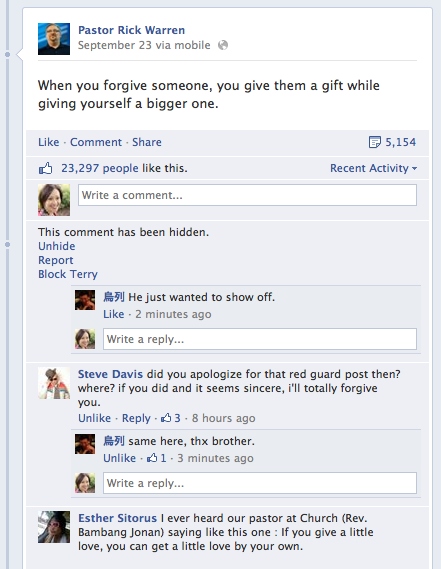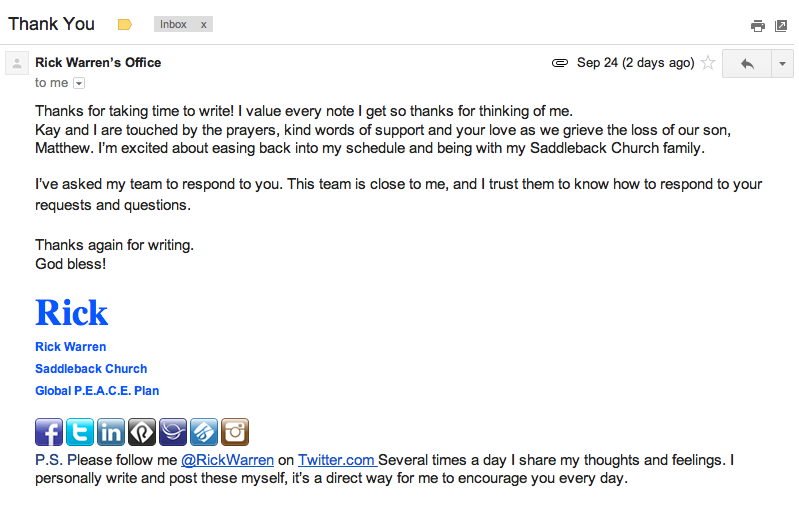I slept on it.
I closed my eyes, rubbed some essential oils into my scalp, took many deep, cleansing breaths, and finally went to sleep.
The questions were still there when I woke up, suspended in my mind and heart like the cobwebs in my dining room. What does it really mean to extend grace? What does it mean to apologize? What does reconciliation look like in a case like this? Why hasn’t the dance studio sent Bethany’s dance class history? Do we have enough milk? Crap, I didn’t wash Elias’ cross country shirt. Should I have just stayed out of this Rick Warren mess? What will my boss think?
This is all to explain that I do not consider myself an activist. I am passionate, articulate, ambitious. I am a Christian Asian American woman who has been married for more than 20 years and the proud, proud mama of Bethany, Corban and Elias. I am vain. I use eye cream religiously. I am tired. I am in need of a savior so I am deeply grateful Jesus volunteered for that job. I am a wife, mother, writer, friend, sister, daughter, neighbor, advocate. And maybe I need to add activist after all because I can’t drop this just yet. I want to bring some more clarity and understanding over why I chose to blog about the issue, keep up the post and images, and review it today.
Yesterday things exploded on the internet over Rick Warren’s post of an image of a female Red Guard member with the caption “The typical attitude of Saddleback staff as they start work each day.” Warren’s original post went up early Monday, September 23, on Warren’s official Facebook page. Within hours (my guess), readers posted both their concerns over the political and historic overtones of the image as well as their support for the attempt at humor. The FB comment thread was disheartening. There is nothing quite like watching your family’s dirty laundry aired out over FB, and that is what it felt like. There is no joy in showing the world that indeed Christians are imperfect, rude, and in desperate need of the very Jesus we tell everyone else they need.
But it’s necessary to air that out, because the truth will set us free or something like that.
So after all of the requests to acknowledge the mistake and apologize Dr. Sam Tsang got this response on his blog:
Thanks so much for teaching us! It was removed instantly. May God bless you richly. Anytime you have guidance, you (or anyone else) can email me directly, PastorRick@saddleback.com.
May the grace of Jesus be your experience today. Thanks again! Your servant, Rick Warren.
P.S. In 1979, Kay and I felt called of God to serve in China but we were prevented by the government at that time. I had already been a part of planting a church near Nagasaki, Japan where I lived in 1974. When our plans were blocked, we ended up planting Saddleback in California.
Hold all comments for now. Just. Wait.
At this point the entire FB thread, along with the image, and the related Twitter post were removed. “Instantly” meaning 1.5 days later, but whatever. English is not my first language. Poof. Gone. The public discourse, which revealed so many blind spots in our North American evangelical mindset, disappeared. And Warren’s own public comments telling sincere FB followers to essentially get over it and adopt his sense of biblical humor disappeared.
Dr. Tsang’s response today is incredible. My heart tightens when I read it because I can’t hold my tongue with such grace and patience. And lucky for me and you, I am not a Yellow Man. This one ain’t my burden to bear. Wink.
When my husband and I hurt each other, or when my children and I hurt each other, we ask for forgiveness and we apologize. We also try, or are prompted, to explain what we are apologizing for. It’s not nearly as public as what happened with Warren and his faithful supporters, but it hurts, breaks trust, and requires some wisdom.
Soooooo. My little thing is that I don’t see an apology. It’s just semantics, right? Do you see an apology? Because I don’t. And I want to extend grace and turn a blind eye and all of those gracious Christian-y things, but man this is a crazy power dynamic. In my mind there are days when I think I’m a pretty big deal, but I’m not and my kids remind me I’m their favorite mom but I’m not a big deal. So when someone who is a big deal tells a bunch of people to get over it and allows his followers to do the same and lightning speed on FB. Well, that’s a big deal.
And because it all happened on social media, there is proof. BUT WAIT. NO THERE ISN’T. He took it down because …. I don’t know. Because Dr. Tsang was “teaching” him?
There is no public apology or acknowledgement of what the problem and offense actually was. Warren erased it, and along with it the proof. What could’ve been a wonderful opportunity to help his followers understand that leaders of international influence make public mistakes, don’t get the whole cross-cultural thing which is pretty important to missionaries, that he made a mistake, that he apologizes and asks for forgiveness and would they, his followers, who thought the whole Red Guard thing wasn’t a big deal, should do the same, has the appearance of a bunch of online activists shutting him down.
Fine.
It’s happened before. Deadly Viper. Rickshaw Rally. I’ll even throw in A & F. But when evidence of the conflict is completely erased, it opens the door for a new narrative. It happened with DV and it breaks my heart (and sometimes makes my blood boil). That controversy wasn’t about a small group of Asians upset about Asiany things being used for the Gospel. That controversy was about Christians calling out other Christians for ignorant if not racist images and language being used in the name of Jesus. And this case feels strangely similar. I love Jesus just like the authors of DV and the creators of Rickshaw Rally, but let’s be clear here. THEY WERE NOT THE VICTIMS. Erasing the proof without public acknowledgement and apology BY A PUBLIC FIGURE COMMITTING A PUBLIC OFFENSE opens the door for a new narrative. And from where I stand, those new narratives are not written by the Yellow Woman.
As of 10 am CST today there is nothing on Warren’s FB page that resembles an apology. He (or someone on his behalf, in which case he ought to acknowledge that) is still updating things – Saddleback Hong Kong launches next month. Hello?!?!?!? There are a few folks trying to bring the issue back by asking if Warren’s snippets of wisdom and encouragement about forgiveness include Warren himself. There are more than 23,000 likes on Warren’s message of forgiveness. Imagine if all 23,000 followers also understood the mistake he had made and read an apology?
See. Glass half full!
In the meantime, I wrote Warren an email last night and sent it to the address he shared with Dr. Tsang. For your reading pleasure, I am posting my letter to Warren. No, I haven’t gotten a reply from a real person, Warren or otherwise. I’ll keep you posted.
In the meantime, I’d love to hear from you in the comments. Did Warren apologize? Did I miss it? What would have been appropriate?
I need to buy some milk.

Do as I say?


 8:06 PM (14 hours ago)
8:06 PM (14 hours ago)
